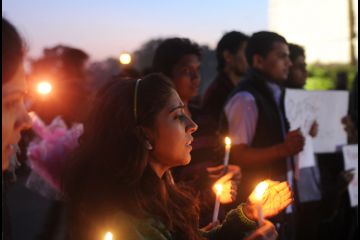
Singapore, December 29: The 23-year-old girl, who put up a brave battle for life after she was gang-raped and brutally assaulted in a Delhi bus a fortnight ago that had created a nationwide outrage, died early on Saturday morning in a hospital here.
The girl, was admitted to the well-known multi-organ transplant facility Mount Elizabeth Hospital here on Thursday morning in an extremely critical condition, breathed her last at 4:45am (2:15am India time). She was earlier treated at the Safdarjung Hospital in Delhi.
"We are very sad to report that the patient passed away peacefully at 4.45am on 29 Dec 2012 (Singapore time)," the hospital's chief executive officer Dr Kelvin Loh said in a statement.
"Her family and officials from the High Commission of India were by her side. The Mount Elizabeth Hospital team of doctors, nurses and staff join her family in mourning her loss," the statement said.
The body has been moved to the mortuary in the Singapore General Hospital for completion of some formalities since she is a foreigner, sources said.
The family of the girl wants the body to be taken to India, Indian High Commissioner T C A Raghavan told reporters.
He said the girl, who was conscious, fought a brave battle till the end. She was brought to Singapore for being provided good medical treatment.
"The family is shattered by this development. At the same time, they realised that best possible medical attention was given. And in the end it was the scale of injuries that proved too much for the medical attention provided to her," the envoy said.
He said the final few hours was a trying time for the girl's family and they bore the entire process with a great deal of fortitude and courage.
Raghavan said the family has requested that their privacy be respected in their hour of grief.
The girl, accompanied by her parents, was was flown in an air ambulance in a critical condition on Wednesday night after her health had suffered a setback that morning in the Delhi hospital following a government decision over which experts were divided.
The six-hour journey itself was said to have been eventful with her blood pressure having dipped alarmingly.
The patient had remained in an extremely critical condition since admission to hospital in the morning of December 27 (Singapore time), the Mount Elizabeth hospital statement said.
"Despite all efforts by a team of eight specialists in Mount Elizabeth Hospital to keep her stable, her condition continued to deteriorate over these two days."
The hospital statement said "She had suffered from severe organ failure following serious injuries to her body and brain. She was courageous in fighting for her life for so long against the odds but the trauma to her body was too severe for her to overcome."
"We are humbled by the privilege of being tasked to care for her in her final struggle. We acknowledge the faith the Indian government and the patient's family have placed with us to ensure the best care possible was indeed provided to her at Mount Elizabeth Hospital," it said.
"We share their huge sadness at her passing and will work with the High Commission of India to provide the family support in this time of grief," said Dr Loh.
Late last night, the hospital said the condition of the rape victim had taken a "turn for the worse".
"As of 9pm (6:30pm IST), the patient's condition has taken a turn for the worse. Her vital signs are deteriorating with signs of severe organ failure," Loh had said in a statement.
"This is despite doctors fighting for her life including putting her on maximum artificial ventilation support, optimal antibiotic doses as well as stimulants which maximise her body's capability to fight infections," the CEO had said.
During her treatment in Safdarjung Hospital, the girl's condition had recorded several ups and downs. Three days after the attack, her gangrenous intestine was removed.
The bestial attack on the girl and her male friend in the bus had sparked off protests by students and women activists which took a violent turn in the capital last Saturday and Sunday.
Death for rapists was one of the demands of the protesters and the victim's demise could trigger fresh display of emotions on the streets.
One of the Delhi police constables Subhash Chand Tomar died in a government hospital on Tuesday and the post-mortem report had said that he had suffered a cardiac arrest from complications arising out of injuries on his chest and neck.
Shaken by the public outrage, government constituted a Commission of Inquiry into the incident and also set up a three-member Committee under former Supreme Court Chief Justice A S Anand to look into the possibility of rewriting the laws relating to aggravated sexual assault and enhancing penalty for it.
Congress president Sonia Gandhi had on Friday demanded speedy action against the perpetrators of the "barbarous" attack while Prime Minister Manmohan Singh said the government was committed to bringing the guilty to justice as soon as possible.







Comments
Add new comment